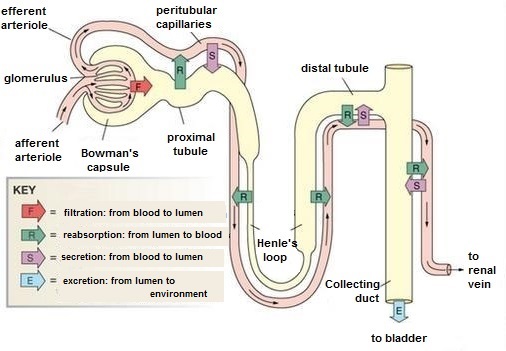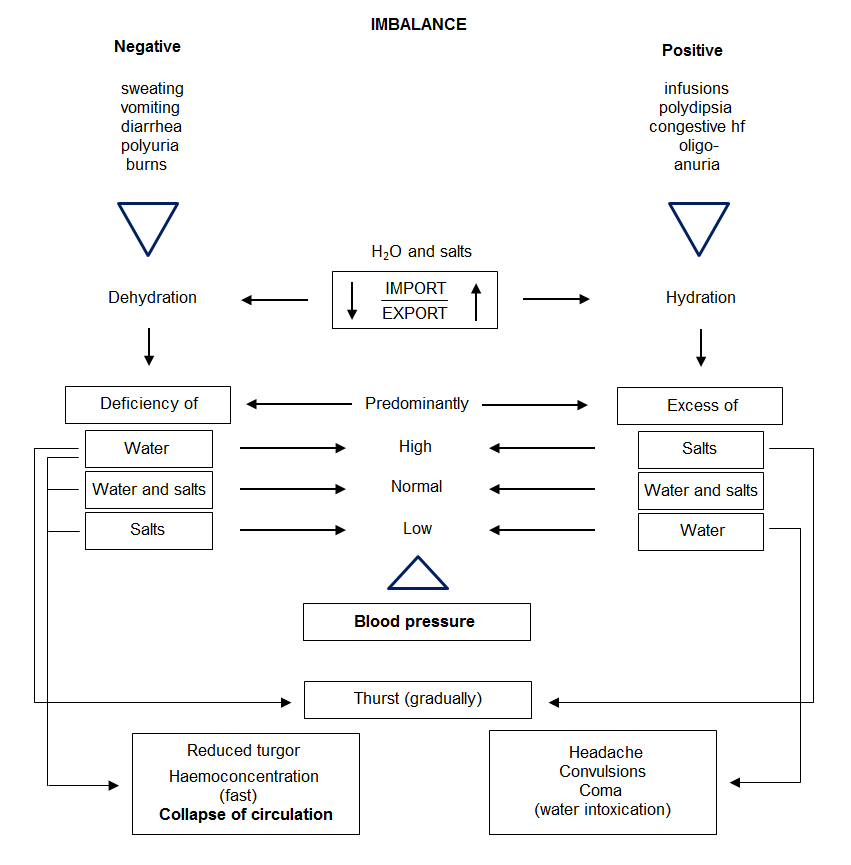Water Diuretic. Water except anything else is the best diuretic. For those unfamiliar let me clarify that diuretics are a group of chemicals which I purposely do not call drugs because they treat nothing at all that reduce blood pressure temporarily causing the kidneys to excrete large amounts of water for a short time. These create dependence for life to their intake and accordingly the need to regularly visit the so called "doctors" as they daily force the body to be accustomed to a condition called hypertension - increased vascular tone or blood pressure caused by persistent dehydration which diuretics provoke. What do I mean? Going to the doctor complaining of high blood pressure the latter instead of asking you most naturally how much water do you drink he will immediately push at your hands diuretics to "excrete" water for "reduction" of blood pressure. Alright but which water? That explanation which I am going to present you now no doctor will ever give you because otherwise the offices of cardiologists will stay empty. Let’s make it clear - written lines that follow are periphrasis of what is in the textbooks of physiology and pathophysiology regarding water-salt balance of the body which is a part of the homeostasis of the body i.e. my words can be checked very easily opening any textbook on the subject. The explanation is illustrated in Figure 3. So, water is the best diuretic. If you have high blood pressure, drink over a period of 10-15 minutes the amount of 1 to 1,5 liters of water. I guarantee you that within one hour your blood pressure will return to normal physiological range (80-120 mmHg). What is the mechanism behind this phenomenon? Into the body water is located both in the cell and outside the cell also known as - intercellular space, extracellular space or interstitium. A major player in the distribution of water into and out of the cell plays one of macroelements in the body namely sodium (Na+). When the body is dehydrated (lacks water) it is so arranged as to put a sufficient amount of sodium ions into the cell as they in turn retain water in it. The water in the cell is required for continuously undergoing cellular processes in which the most egotistic are brain cells. When brain cells lose 1% of the water they need it leads to irreversible consequences and their death! Therefore when taking diuretics renal glomeruli in the capsule of Bowman filter blood separating water from it, the micro and macroelements and by performing reverse osmosis in the proximal and distal tubules of the nephron and the loop of Henle some of these substances are sent back in the bloodstream but in the least amount water is returned because diuretics inhibit the process of its reabsorption into the blood and deliver it to the bladder. Figure 1.
Figure 1. Scheme of kidney filtration and excretion of urine
That is why during the action of the diuretic the circulating blood is less saturated with water and it increases its osmolarity. This condition raises a necessity for restoration of the osmotic balance between intra- and extracellular fluid and thus water comes out from the cell but that shall last briefly. As I said cellular processes are carried out continuously and they need a huge amount of water at any moment.
Because the doctor tells you that you need to excrete water to reduce the blood pressure but does not specify that you must recover its loss due to diuresis occurred then you leave with the belief that drinking water raises your blood pressure even more by default. NO, THIS IS A BIG MISTAKE! Withholding the truth doctors very conveniently provoke into you deliberate confusion. Water returns very quickly, after just a few hours, back into the cell and you find yourself again with high blood pressure over and over resorting to the "good" pill that your doctor prescribed and this is how you fall into the cycle of eternal hypertension. That is why I said above that diuretics do not cure but only briefly mask the consequences of the fact that you are dehydrated in the most harmful way for you. Water cures! High blood pressure is due to the dehydration of the body. Swelling in the legs and face are the result of compensatory water retention in the body's cells and are a sign and proof of serious dehydration. It sounds contradictory but it is absolutely true.
I should add some more information to complete in entirety the explanation begun. It is mandatory to mention the importance of sodium (Na+). For high blood pressure your doctor tells you to reduce salt in your diet which most commonly you take with sodium chloride (NaCl) i.e. cooking salt. But only so delivered this statement is a crime! To reduce but how much? What if salt is not much but your blood pressure is high? Common tales of those who do not aim to help you but maintain you sickness for a lifetime to peel your skin with expensive examinations. What to do with the salt? It is simple! Visit a medical laboratory. Ask for a Complete Blood Count (CBC) to which to be added Na (sodium) and K
(potassium). These are extremely cheap examinations. If sodium is the norm there is no reason for reducing the daily amount of salt in your diet. Then responsibility for the high blood pressure falls on the insufficient amount of water you take. However if it turns out that sodium is below the physiological limit increase the daily amount of salt used by adding for a couple of days to 1.5 ltrs of water half a coffee spoon of salt. Measure your blood pressure to monitor the change few times a day. Remember! In the textbooks of pathophysiology one of the main lessons that future doctors learn is the lesson on water-salt balance i.e. drinking water should always be accompanied by adequate intake of salt so that you may not fall into hypotension (low blood pressure – due to hyperhydratation of the body or due to the lack of sodium) nor in hypertension (high blood pressure - due to dehydration or excess of salt ).
Potassium is important for the contractility of the heart - the power of its contraction and relaxation. The relationship with diuretics is that their intake gradually but surely washes out potassium from the body for which your doctor also will not warn you. With the decrease of potassium in the myocardium (heart muscle cells) heart gradually falls into a state of arrhythmicity which manifests itself as irregular heartbeat, tahi- or bradycardia (fast or slow heartbeat). As these heart problems will be added to the main (high blood pressure) once again you will have reason to visit your GR (General Practitioner). He willingly will prescribe preparations from the group of potassium sparing diuretics - such as Spironolactone used to keep potassium in the body. Deficiency of potassium is visible from any cardiogram and if your cardiologist is at least somewhat literate on the topic of Medicine he will establish its absence at a glance. Figure 2.
Figure
2.
ECG-changes in potassium imbalance.
The arrow indicates the level of serum potassium in the corresponding ECG image.
In fact the solution is simple and even very pleasant. Instead giving you another pill the conscientious doctor will not prescribe you conventional and potassium sparing diuretics but will gave you a bottle of mineral water, a pinch of salt and two bananas or ten apricots because the last two are extremely rich in potassium. Drink water for normal blood pressure.
Figure 3. Main types of disturbances of water-salt balance in the body
| | | |


